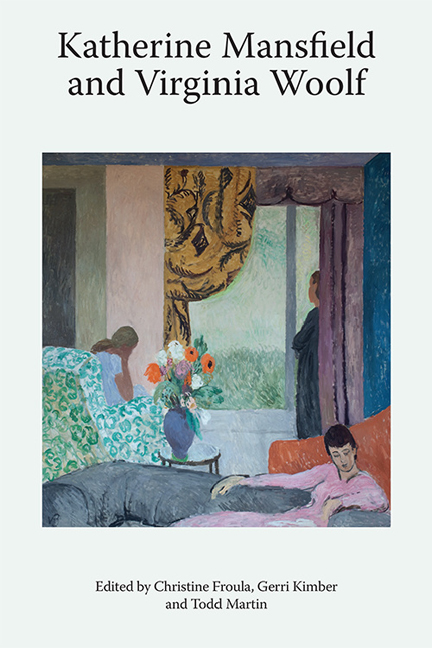Together and Apart
Published online by Cambridge University Press: 07 May 2021
Summary
Together
They did not, as Virginia Woolf maintained to Vita Sackville West, ‘coalesce’ (VWL4, p. 366). Nor was there any reason to expect they ever could. Katherine Mansfield was ‘colonial’, a ‘dark-eyed tramp’ who, when not roaming the continent in search of work and health, anxiously, often pennilessly, hovered about the artistic coteries where modernist art was being invented. Woolf, descended from a distinguished line of eminent Victorians, was securely, eventually famously embedded in one of modernism's most innovative artistic enclaves. There was little in their backgrounds, temperaments or personal, especially sexual, experiences to promote sororal affinity. And yet Mansfield was just a week dead when Virginia Woolf confided in her diary that ‘probably we had something in common which I shall never find in anyone else’. Woolf attributed their unduplicable rapport to Mansfield's ‘caring so genuinely if so differently from the way I care about our precious art’ (VWD2, p. 228). Perhaps only in death could Woolf finally agree to the less equivocal version of their relationship that Mansfield had put to her years before: ‘We have got the same job, Virginia, & it is really very curious & thrilling that we should both, quite apart from each other, be after so very nearly the same thing. We are you know; there's no denying it’ (Letters 1, p. 327).
One can feel no need to deny it and yet still wonder what that ‘something in common’ actually was and why Woolf, given her extensive and varied circle of family and friends, and indeed her own youth, felt so inconsolable upon the loss – not simply the diminishment – of it. Surely Bloomsbury provided Woolf with the company and conversation of writers and painters who also genuinely cared for their ‘precious art’. What was it about Mansfield's devotion to her writing that led Woolf to think of her as an irreplaceable writerly semblable? Perhaps one answer is to be found in Woolf's 1927 review of Mansfield's Journal, in which Woolf finds poignant evidence of Mansfield's ‘terribly sensitive mind’.
- Type
- Chapter
- Information
- Katherine Mansfield and Virginia Woolf , pp. 29 - 41Publisher: Edinburgh University PressPrint publication year: 2018



